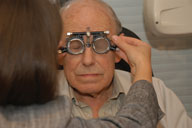Statistics released by the NHS this week show that optometrists in Great Britain are now performing fewer sight tests than at any point in the past 10 years.
The Sight Tests Volume and Workforce Survey, Great Britain report highlighted that on average optometrists carried out 35.5 eye examinations, compared to 40.3 in 2000-01.
One reason for this could lie in a significant increase in the number of practising optometrists. In 2005-06, there were 9,242 practising optometrists, 7.5 per cent higher than in 2003-04 and one third more than 1996-97 when there were 6,665.
Of the 9,242 practising, 6,079 were full-time the remaining third working part-time. The NHS information centre calculated a total of 7,695 full-time equivalent optometrists in practice in 2005-06. An average full-time optometrist worked 38 hours, 12 minutes, while a part-time employee worked 19 hours, 40 minutes.
Register now to continue reading
Thank you for visiting Optician Online. Register now to access up to 10 news and opinion articles a month.
Register
Already have an account? Sign in here
